- Home
- Josephine Tey
The Singing Sands ag-6 Page 2
The Singing Sands ag-6 Read online
Page 2
Considering the high degree of intelligence that had put into words that nightmare hazard at the gates of Paradise, it was obvious that it was not lack of personality that had kept the young man’s writing adolescent. His personality—his vitality and interest—had gone into something else.
Into what? Something active, something extrovert. Something in which writing was used for messages like: ‘Meet me Cumberland bar, 6.45, Tony’, or for filling up a log.
But he was introvert enough to have analysed and put into words that country-of-the-moon on the way to his Paradise. Introvert enough to have stood apart and looked at it; to have wanted to record it.
Grant sat in a pleasant warm daze, chewing and considering. He noted the tightly-joined tops of the n’s and m’s. A liar? Or just secretive? A curiously cautious trait to appear in the writing of a man with those eyebrows. It was a strange thing how much the meaning of a countenance depended on eyebrows. One change of degree in the angle this way or that and the whole effect was different. Film magnates took nice little girls from Balham and Muswell Hill and rubbed out their eyebrows and painted in other ones and they became straightway mysterious creatures from Omsk and Tomsk. He had once been told by Trabb, the cartoonist, that it was his eyebrows that had lost Ernie Price his chance of being Prime Minister. ‘They didn’t like his eyebrows,’ Trabb had said, blinking owlishly over his beer. ‘Why? Don’t ask me. I just draw. Because they looked bad-tempered, perhaps. They don’t like a bad-tempered man. Don’t trust him. But that’s what lost him his chance, take it from me. His eyebrows. They didn’t like ’em.’ Bad-tempered eyebrows, supercilious eyebrows, calm eyebrows, worried eyebrows—it was the eyebrows that gave a face its keynote. And it was the slant of the black eyebrows that had given that thin white face on the pillow its reckless look even in death.
Well, the man had been sober when he wrote those words, that at least was clear. That toper’s oblivion in compartment B Seven—the fugged air, the rucked blankets, the empty bottle rolling about on the floor, the overturned glass on the shelf—may have been the Paradise he sought, but he was sober when he blue-printed the way to it.
The singing sand.
Uncanny but somehow attractive.
Singing sand. Surely there actually were singing sands somewhere? It had a vaguely familiar sound. Singing sands. They cried out under your feet as you walked. Or the wind did it, or something. A man’s forearm in a checked tweed sleeve reached in front of him and took a bap from the plate.
‘You seem to be doing yourself very well,’ Tommy said, pulling out a chair and sitting down. He split the bap and buttered it. ‘There’s no chew in these things at all nowadays. When I was a boy you sank your teeth in them and pulled. It was evens which came away first: your teeth or the bit of bap. But if your teeth won you really had something worth having. A nice floury, yeasty mouthful that would last you for a couple of minutes. They don’t taste of anything nowadays, and you could fold them in two and put the whole thing in your mouth without any danger of choking yourself.’
Grant looked at him in silence and with affection. There was no intimacy so close, he thought, as the intimacy that bound you to a man with whom you’d shared a Prep. school dorm. They had shared their public school days too, but it was Prep. school that he remembered each time he encountered Tommy anew. Perhaps because in all essentials that fresh pinky-brown face with the round ingenuous blue eyes was the same face that used to appear above a crookedly-buttoned maroon blazer. Tommy had always buttoned his blazer with a fine insouciance.
It was so like Tommy not to waste time or vitality on conventional inquiries as to his journey and his health. Neither would Laura, of course. They would accept him as he stood; as if he had been there for some time. As if he had never gone away at all but was still on his previous visit. It was an extraordinarily restful atmosphere to sink back into.
‘How is Laura?’
‘Never better. Putting on a bit of weight. At least that’s what she says. Don’t see it myself. I never liked skinny women.’
There had been a time, when they were both about twenty, when Grant had thought of marrying his cousin Laura; and she, he had been sure, had had thoughts of marrying him. But before any word had been said the magic had faded and they were back on the old friendly footing. The magic had been part of the long intoxication of a Highland summer. Part of hill mornings smelling of pine needles, and of endless twilights sweet with the scent of clover. For Grant his cousin Laura had always been part of the happiness of summer holidays; they had graduated together from burn-paddling to their first fishing-rods, and together they had first walked the Larig and together had stood for the first time on the top of Braeriach. But it was not until that summer at the end of their adolescence that the happiness had crystallised into Laura herself; that the whole of summer was focused into the person of Laura Grant. He still had a slight lifting of the heart when he thought of that summer. It had the light perfection, the iridescence, of a bubble. And because no word had been said the bubble would never now be broken. It stayed light and perfect and iridescent and poised, where they had left it. They had both gone on to other things; to other people. Laura indeed had skipped from one person to the next one with the bright indifference of a child playing hop-scotch. And then he had taken her to that Old Boys’ dance. And she had met Tommy Rankin. And that had been that.
‘What’s the fuss at the station?’ Tommy asked. ‘Ambulances and things.’
‘A man died on the train. I expect it is that.’
‘Oh,’ said Tommy, dismissing it. ‘Not your funeral this time,’ he added in a congratulatory way.
‘No. Not my funeral, thank Heaven.’
‘They’ll miss you on the Embankment.’
‘I doubt it.’
‘Mary,’ said Tommy, ‘I could do with a pot of good strong tea.’ He flicked the plate that held the baps with a contemptuous forefinger. ‘And another couple of these poor bargains.’ He turned his serious childlike gaze on Grant and said: ‘They’ll have to miss you. They’ll be one short, won’t they?’
Grant expelled his breath in the nearest he had come to a laugh for months. Tommy had been commiserating with Headquarters, not on the loss of his genius, but on the lack of his presence. His ‘family’ attitude had been almost identical with the professional reaction of his Chief. ‘Sick leave!’ Bryce had said, his little elephant eyes running over Grant’s healthy-looking frame and coming back to his face with disgust. ‘Well, well! What is the Force coming to! In my young days you stayed on duty until you fell over. And you went on writing up your notes until the ambulance carted you away off the floor.’ It had not been easy to tell Bryce what the doctor had said, and Bryce had not made it any easier. Bryce had never had a nerve of any sort in his body; he was mere physical force animated by a shrewd if limited brain. There had been neither comprehension nor sympathy in his reception of Grant’s news. Indeed, there had been a subtle suggestion, a mere whiff of an implication, that Grant was malingering. That this so-strange breakdown that left him so markedly well and fit in appearance had something to do with the spring run in Highland rivers; that he had already arranged his fishing flies before going to Wimpole Street.
‘What will they do to fill the gap?’ Tommy asked.
‘Promote Sergeant Williams, probably. His promotion is long overdue anyhow.’
It had been no easier to tell the faithful Williams. When your subordinate has openly hero-worshipped you for years it is not pleasant to have to appear before him as a poor nerve-ridden creature at the mercy of non-existent demons. Williams, too, had never had a nerve in his body. He took everything as it came, placid and unquestioning. It had not been easy to tell Williams and see the admiration change to concern. To—pity?
‘Push over the marmalade,’ Tommy said.
2
The peace induced by Tommy’s matter-of-fact acceptance of him deepened as they drove into the hills. These two accepted him; standing around in a detached be
nevolence, watching him come in a familiar quiet. It was a grey morning, and still. The landscape was tidy and bare. Tidy grey walls round bare fields, bare fences along the tidy ditches. Nothing had begun to grow yet in this waiting countryside. Only a willow here and there by a culvert side showed live and green in the half-shades.
It was going to be all right. This is what he had needed; this wide silence, this space, this serenity. He had forgotten how benevolent the place was; how satisfying. The near hills were round and green and kind; beyond them were farther ones, stained blue by the distance. And behind all stood the long rampart of the Highland line, white and remote against the calm sky.
‘The river is very low, isn’t it?’ he said, as they came down into the valley of the Turlie. And was invaded by panic.
That was the way it always happened. One moment a sane, free, self-possessed human being, and the next a helpless creature in the grip of unreason. He pressed his hands together to keep himself from flinging the door open and tried to listen to what Tommy was saying. No rain for weeks. They had had no rain for weeks. Let him think about the lack of rain. It was important, the lack of rain. It spoiled the fishing. It was to fish he had come to Clune. If they didn’t have rain there would be no run of fish. No water for them. Oh God, help me not to make Tommy stop! No water. Think intelligently about fishing. If they had had no rain for weeks then rain must be due, mustn’t it? Why could you ask a friend to stop the car and let you be sick and yet not ask him to stop the car so that you could get out of its small shut-in-ness? Look at the river. Look at it. Remember things about it. That was where you caught your best fish last year. That was where Pat slipped down when he was sitting on the rock and was left hanging by the seat of his pants.
‘As nice a clean-run fish as ever you saw,’ Tommy was saying.
The hazels by the river made a bright mauve smudge in the grey-green of the moor. Presently, when it was summer-time, the cold clattering of their leaves would make an obbligato to the river’s song, but just now they stood in a pink silent huddle along the bank.
Tommy, looking at the state of the water, also noticed the bare hazel twigs, but being a parent he was not moved to think of summer afternoons. ‘Pat has discovered that he is a diviner,’ he said.
That was better. Think about Pat. Talk about Pat.
‘The house is strewn with twigs of all shapes and sizes.’
‘Has he discovered anything?’ If he could keep his mind on Pat it might be all right.
‘He has discovered gold under the sitting-room hearth, a body under the whatyoumaycallem in the downstairs bathroom, and two wells.’
‘Where are the wells?’ It couldn’t be so very long now. Five miles to the head of the glen and Clune.
‘One under the dining-room floor and one under the kitchen passage.’
‘I take it that you haven’t dug up the sitting-room hearth.’ The window was wide open. What was there to worry about? It wasn’t really a closed space, not a closed space at all.
‘We have not. He is very peeved about that. Said I was a once-born.’
‘Once-born?’
‘Yes. It’s his latest word. It ranks just one degree below a stinker, I understand.’
‘Where did he get the word?’ He would hang on till they got to that birch wood at the corner. Then he would ask Tommy to stop.
‘Don’t know. From some Theosophist woman who talked to the W.R.I, last autumn, I should think.’
Why should he mind Tommy’s knowing? There was nothing shameful about it. If he were a paralysed syphilitic he would accept Tommy’s help and sympathy. Why should he want to keep from Tommy’s knowledge the fact that he was sweating with terror because of something that didn’t exist? Perhaps he could cheat? Perhaps he could just ask Tommy to stop for a little while he admired the view?
Here was the birch wood. At least he had lasted that far.
He would make it the bit of road level with the bend of the river. He would make the excuse of having a look at the water. Much more plausible than looking at the view. Tommy would look with alacrity at a river and only with passive protest at a view.
About fifty seconds more. One, two, three, four….
Now.
‘We lost two sheep in that pool this winter,’ Tommy said, sweeping past the bend.
Too late.
What other excuse could he make? He was too near Clune now for excuses to be easy to find.
He could not even light a cigarette in case his hands were shaking too much.
Perhaps if he did something, however trivial….
He took the bundle of papers from the seat by his side, rearranging them, shuffling them busily and without point. He noticed that the Signal was not among them. He had meant to take it with him because of the odd little tentative verse in the Stop Press, but he must have left it in the hotel dining-room. Oh, well. It didn’t matter. It had served its turn in giving interest to his breakfast. And the owner certainly would not want it again. He had achieved his Paradise, his oblivion; if that is what he had wanted. Not for him the privilege of uncontrolled hands and sweating skin. The privilege of wrestling with demons. Not for him the clean morning, the kind earth, the loveliness of the Highland line against the sky.
For the first time it occurred to him to wonder what had brought the young man to the North.
He had not, presumably, engaged a first-class sleeping compartment just to drink himself insensible in. He had had an intended destination. He had had business and desire. A purpose.
Why had he come to the North at this bleak unfashionable season? To fish? To climb? The compartment as he remembered it had given an impression of bareness, but the heavy luggage might have been under the bunk. Or, indeed, in the van. Apart from sport what was there?
Official business?
Not with that face; no.
An actor? An artist? Just possibly.
A sailor going to join his ship? Going to some naval base beyond Inverness? That was possible. The face would look very well on the bridge of a ship. A small ship; very fast; and hellish in any kind of a sea.
What else was there? What would bring a dark, thin young man with reckless eyebrows and a passion for alcohol to the Highlands at the beginning of March? Unless in these days of whisky shortage he had had thoughts of starting an illicit still?
It was a pleasant idea, at that. How easy would it be? Not as easy as in Ireland, because the will to lawlessness was lacking; but once you had achieved it the whisky would be a great deal better. He almost wished that he could have put the idea to the young man. Could have sat opposite him at dinner last night, perhaps, and watched the gleam come into his eye at the thought of such delicious flouting of the Law. He wished that he could have talked to him anyway; exchanged ideas with him; found out about him. If someone had talked with him last night he might now be part of this living morning, of this fine gracious world with its gifts and its promise, instead of—
‘And gaffed him in the pool below the footbridge,’ said Tommy, finishing a story.
Grant looked down at his hands, and found that they were still.
The dead young man, who could not save himself, had saved him.
He looked up and saw in front of him the white house of Clune. It lay in the green cup of the hill, alone except for its attendant slab of sheltering fir-wood stuck like some dark green wool-work on the bare landscape. A blue curl of smoke rose up from the chimney into the still air. It was the fine essence of peace.
As they drove up the sandy track from the road he saw Laura come out of the door and stand waiting for them. She waved to them, and as her arm came down from its wave she tucked in the strand of hair that fell on to her forehead. The familiar gesture warmed his chilled being. Just so she used to be waiting on the little Badenoch platform for him when she was a child; with just that wave and that tucking-in of a strand of hair. The same strand of hair.
‘Damn,’ said Tommy, ‘I forgot to post her letters. Don’t mention it un
less she asks.’
Laura kissed him on both cheeks, took one look at him, and said:
‘I have a lovely bird for your lunch, but you look as if a good long sleep would do you more good. So go straight up and have it and forget about food until you waken. We have weeks to gossip in, so we don’t have to start right now.’
Only Laura, he thought, would have streamlined her hostess rôle to a guest’s need so neatly. No subtle touting of the beautifully planned luncheon; no concealed blackmail. She did not even ply one with unwanted cups of tea, nor pointedly recommend her fine hot bath-water. She did not even demand the small-chat of arrival, the polite hanging around. She supplied without question and without hesitation the thing that he needed. A pillow.
He wondered whether it was that he looked a wreck or whether it was just that Laura knew him so well. It occurred to him that he would not mind Laura’s knowing about his bondage of fear. It was odd that where he had shrunk from exhibiting his weakness to Tommy he should not care that Laura might learn about it. It should have been the other way about.
‘I have put you in the other bedroom this time,’ she said preceding him up the stairs, ‘because the west one has been done up and it still stinks a bit.’
She was in truth putting on weight a little, he noticed; but her ankles were as good as ever. And then, with that native detachment that never quite deserted him, he realised that his lack of any desire to conceal from Laura his childish fits of panic was proof that no small remote part of him was still in love with her. The need of the male to look well in the eyes of the beloved one was no part of his relation with Laura.
‘People always say about east bedrooms that they get the morning sun,’ she said, standing in the middle of the east bedroom and looking at it as if she had never seen it before. ‘As if it were a recommendation. I think myself it’s much nicer to be able to look out on a sunny landscape. Which you can’t do with the sun in your eyes.’ She stuck her thumbs in her waistband and eased the belt that was growing too tight. ‘But the west room will be habitable in a day or two, so you can change over then if you want to. How is my dear Sergeant Williams?’

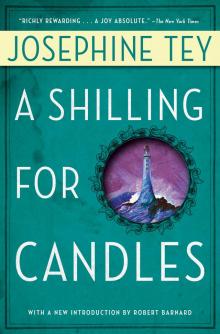 A Shilling for Candles
A Shilling for Candles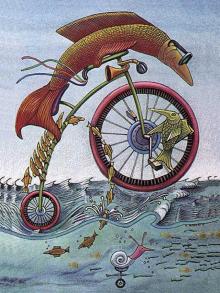 The Singing Sands
The Singing Sands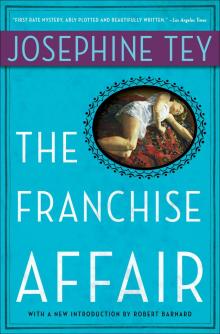 The Franchise Affair
The Franchise Affair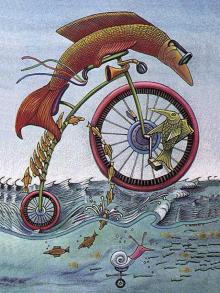 Daughter of Time
Daughter of Time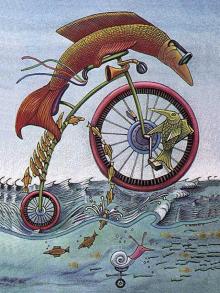 To Love and Be Wise
To Love and Be Wise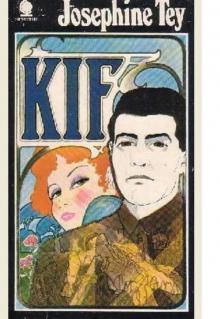 Kif
Kif The Expensive Halo: A Fable Without Moral
The Expensive Halo: A Fable Without Moral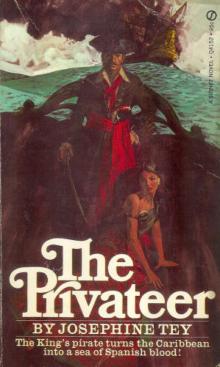 The Privateer
The Privateer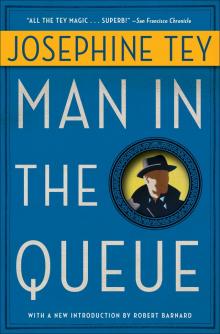 The Man in the Queue
The Man in the Queue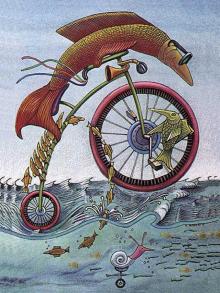 Miss Pym Disposes
Miss Pym Disposes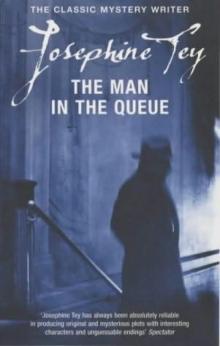 The Man in the Queue ag-1
The Man in the Queue ag-1 Brat Farrar
Brat Farrar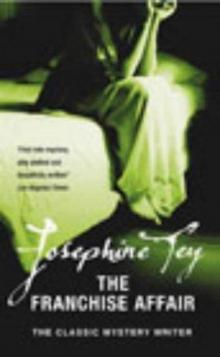 The Franchise Affair ag-3
The Franchise Affair ag-3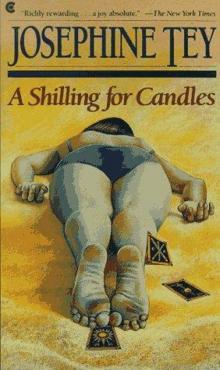 A Shilling for Candles ag-2
A Shilling for Candles ag-2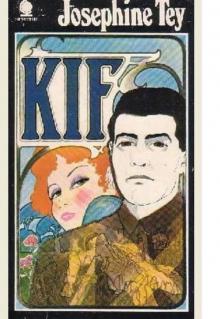 Kif: An Unvarnished History
Kif: An Unvarnished History The Expensive Halo
The Expensive Halo The Singing Sands ag-6
The Singing Sands ag-6 To Love and Be Wise ag-4
To Love and Be Wise ag-4